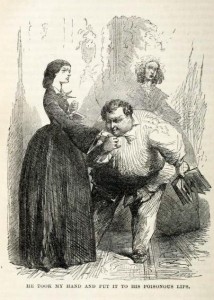In his 1862 essay “Why are Women Redundant?” William Rathbone Greg laments the excess population of single, unmarried women in Great Britain. Greg argues that this excess leads to moral and social evils such as women finding employment outside of the home and women having sexual relations with other women. To remedy this problem, Greg offers a plan for female emigration in order to restore the balance between the sexes.
While Greg’s proposition may appear ridiculous to twenty-first-century readers, reading Greg’s essay alongside Wilkie Collins’s The Woman in White illuminates Collins’s deep engagement with this issue of the redundant woman in his novel, particularly through the characters of Anne Catherick and Marian Halcombe.
In her almost identical physical appearance to Laura Fairlie, Anne Catherick is redundant because she is essentially the duplicate of another woman. The novel later reveals that Laura and Anne are half sisters by the same father. Because Laura is legitimate and married, she survives; by contrast, Anne—illegitimate and unmarried—dies. Anne’s death solves the problem of this redundancy, but not before their likeness enables Sir Percival and Count Fosco to create an elaborate scheme to steal Laura’s identity and fortune. In light of Greg’s essay, Collins appears to be commenting on the danger of redundant women.
By the end of the novel, Marian emerges as the true redundant woman. After Walter and Laura marry, they worry about “the consideration of Marian’s future” (621) as a single, unmarried woman. Marian resolves to live with Walter and Laura in what is essentially a marriage of three. Marian’s strange words to Walter deserve closer examination:
“Wait a little till there are children’s voices at your fireside. I will teach them to speak for me, in their language; and the first lesson they say to their father and mother will be – We can’t spare our aunt!”
Marian clearly indicates reproduction as a byproduct of marriage, echoing Greg’s concern over “the abnormal extent of female celibacy” (162). While Marian will be celibate as an unmarried woman, she describes assuming the domestic role of the mother-as-teacher, thereby splitting female obligations between herself and her half sister.
The word “spare” here is particularly complex. On one level, the word functions ironically because “spare” is synonymous with “redundant” or “extra.” The meaning of the sentence, however, lies in tension with this denotation; taking the definition of “spare” as “to part with” (OED), “We can’t spare our aunt!” means that the children believe Marian to be an absolutely essential part of their household. “Spare” may also carry a third, more nefarious meaning that contradicts the second: “to abstain from destroying, removing” (OED). In this interpretation of “can’t spare,” the children admit to the necessity of removing their aunt. According to Greg, this removal is necessary in order to eliminate the redundant woman. Collins clearly packs a lot of ambiguity into this line, which Greg’s essay helps illuminate.

I found your analysis of the word “spare” particularly interesting. While I do agree with your interpretation, I also wonder whether it could be linked with Denver’s reading of Walter, Laura, and Marian’s ‘marriage’, and whether the children will eventually understand this ambiguous position occupied by Marian in their family. In fact, she can be seen both as an essential part of the family, “a full partner in this marriage of three” (Denver,114), justifying the use of the world “spare” in its second meaning, and at the same time as someone who has to be removed, since her role in the family undermines the traditional heterosexual marriage that Greg tries so desperately to preserve.